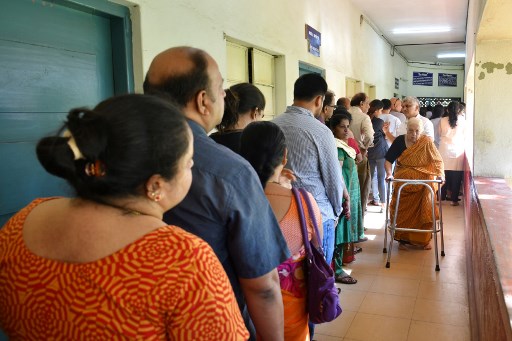
Indian voters line up to cast their ballot during the second phase of the national elections in Bangalore on April 18, 2019. AFP
NEW DELHI, India — Voters across India cast ballots Thursday in the second round of the country’s mega elections amid more deadly violence including a poll worker gunned down by Maoist rebels.
More than 157 million of India’s 900 million voters are eligible to cast ballots on the second of seven days of voting in the world’s biggest election.
Authorities ramped up security again, but in the eastern state of Odisha, a female poll worker was gunned down by suspected Maoist rebels hours before voting started, media reported.
In central Chhattisgarh state, security forces raided a Maoist jungle camp in Dantewada district, killing two insurgents allegedly involved in an attack on an election convoy just before the first round of voting which left five dead, police said.
In Kashmir, tens of thousands of troops, paramilitaries and police were deployed as the main city of Srinagar was one of 95 constituencies across India to take part in voting.
Kashmir surged into Prime Minister Narendra Modi’s campaign after a February suicide bomb attack that killed 40 paramilitaries and brought India and Pakistan — which both control part of divided Kashmir — to the brink of war.
Srinagar was a virtual ghost town with polling stations almost deserted.
By mid-morning, just a handful of voters had turned up at a polling station in a local school, where more than a dozen armed police in bullet-proof vests were posted.
“I hope whoever is elected this time will help get my son a job,” one male voter told AFP, declining to give his name.
Outside another station, a 55-year-old man said he would not vote. “Our leaders have called for the boycott of all Indian elections,” he said.
But in many constituencies across India, men and women lined up from the early morning.
More than 157 million of the 900 million electorate were eligible to cast ballots on the second of seven days of voting.
Modi has put national security at the centre of his campaign to secure a second five-year term.
While seen as the favorite, he faces an increasingly tough challenge from opposition Congress party leader Rahul Gandhi.
Gandhi has gone on a relentless attack against the economic record of Modi’s Hindu nationalist Bharatiya Janata Party (BJP).
Attacks and insults
Thousands of candidates from more than 2,000 parties are competing for 543 seats in parliament. The last vote is on May 19 and final results will be released on May 23.
“I am sure all those whose seats are polling today will strengthen our democracy by exercising their franchise,” Modi tweeted as polls opened.
At a college in Agra, less than two kilometers from the Taj Mahal, dozens of voters waited in line as polls opened.
“I voted because it’s my right, it’s my right to choose a good candidate,” said 32-year-old tour guide Yusuf Ali.
“For us, it’s the development, the education, the employment, that’s the main criteria for us,” he told AFP.
Good times
Modi and the right-wing BJP swept to power in a 2014 landslide with their promise of “achhe din” (“good days”).
He has simplified the tax code and made doing business easier.
But despite growth of about seven percent a year, Asia’s third-biggest economy has not provided enough jobs for the roughly one million Indians entering the labour market each month.
And in rural areas, thousands of indebted farmers have killed themselves in recent years.
Modi sought to counter critics of his campaign in a television interview this week when he said: “If farmers die, then it is an election issue, but when soldiers die then it is not an election issue? How can that be?”
Gandhi fired back in an interview with The Hindu daily, published Thursday, saying Modi’s party had sought to “divert the narrative of this election by making national security their key election narrative.”
“The fact is that the biggest national security issue is unemployment,” he said.
Gandhi, seeking to become the fourth member of his family to take the prime minister’s office, has pledged to end abject poverty by 2030 and give cash transfers to 50 million families.
The BJP has promised a $1.4-trillion infrastructure blitz to create jobs.
There have been repeated allegations of vote-buying in the run-up to the poll, and voting in a constituency in the southern state of Tamil Nadu has been cancelled altogether after $1.5 million in cash was seized by authorities. /ee